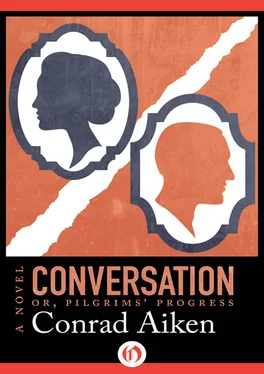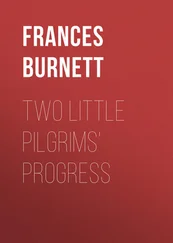“Tirra-loo — tirra-lee — shadows rising on you and me—”
The lilacs, in the morning fog, were a hundred years old already, they stood orderly and precise and hard in the sun-bright fog, sharply outlined where they stood on the terrace wall against the gray river, like sticks in snow. Sand was scattered on the grass, too, which would have to be raked gingerly, or brushed back into the borders, and the deep crescent hoof marks of Terence’s horse, which would have to be filled in and patted down. Shadows rising on you and me — very true, as one looked down from an autumn window; but where did they rise from, what was their source? From the dream? Like fog from the unconscious? Lilacs in sea fog, lilacs standing knee-deep in a dream?
The indiscreet dream about Nora went down the stairs with him like a suppressed radiance, like a dulled singing; the cat shot past him on the stairs— Skippity-skap ! — he said, flicking at the striped tail with his hand, and in the dining room, over the little round white table, Buzzer’s round face opened a round mouth for the tilted spoon of porridge.
“I’m eating porridge,” she said.
“Porridge! No.”
“Yes, porridge.”
“And why , may I ask, didn’t you come to wake me this morning?”
“Mummy wouldn’t let me. She said you were sleeping.”
“Foo! How could you wake me if I wasn’t sleeping? Answer me that!”
“And Chattahoochee was out all night, the naughty cat, and came in hungry as a bear and all skedaddlish—”
“Skedaddlish — who ever heard such a word—”
“And he drank his milk like anything, slup — slup — slup — slup .”
“Quite true. He always drinks his milk four tonguefuls at a time — just the way you ought to eat your porridge.”
“I shouldn’t either! Ho ho, how silly! As if I was a little cat!”
“A red-haired cat.”
“It isn’t red — it’s gold!”
“Red.”
“Gold! And I saw the lilacs, too—”
He kissed the golden, corn-silk golden, curls, pushed the freckled nose solemnly with one finger, went quickly down the gray steps to the kitchen, but Enid, standing at the blue-flame stove in the far corner, didn’t turn, merely said, thus checking his impulse to go to her and kiss her:
“Your breakfast’s ready. I’m not having any.”
“Not having any! Why not, Ee?”
“Thank you, I don’t feel very much like it. You can take the toast and coffee. I’ll bring in your egg in a minute.”
“Didn’t you sleep, darling? Coffee might do you good.”
“I slept quite well, and I won’t want any coffee! Will you take it, please?”
Ah — so it was going to be like that. The preoccupied little hum again, the curved lips compressed a little, the dark curled head turning curtly and quickly — the shadow of the quarrel again, the closed bedroom door. They hadn’t slept together, she hadn’t allowed him to come and sleep with her! He took the coffee percolator from the table, hesitated.
“I think I’ll just take a look at the lilacs first.”
“Couldn’t they wait till after breakfast? I’ve got a hard morning ahead of me, and we’re late as it is.”
“Very well, Ee. Have you looked at them yourself?”
“I’m afraid I’ve been much too busy!”
The quick oblique smile, intolerant, the oblique green flash of the eyes — lovely! — she was wearing the pale green smock, with the gold threads, the one that was his favorite — but was it a concession or a challenge? It went well with the soft-sheened silver-gray of the corduroy skirt, gave an added brilliance and liquidity to the eyes — as, of course, she well knew. Ah, these cunning, vain, merciless wenches!
“They look marvelous,” he said over his shoulder, “but Terence says no blossom till spring after next.”
Spring after next. The dream came like a fog between himself and the shining table, the poured coffee, the silver cream pitcher; it filled the morning-bright, fog-bright room, seemed to set everything at a distance. If Enid had allowed him to kiss her — that would perhaps have broken through the strange dull weight of it, the richly haunting burden — perhaps she too would then have shared in it! Or did she anyway? And did all things, even Buzzer? Perhaps. As it was, it was also as if she had somehow divined his infidelity, and as if her hostility were by a miraculous instinct directed precisely to that. And a hard morning ahead of her, and Binney coming, and himself probably delegated to look after Buzzer — instead of working on his picture—
“Can I go waving this morning, daddy?”
“Not waving, wading!”
“No, waving !”
“Well, you’ll have to ask your mummy about that. Maybe it’s too cold.”
“Well then, we can go and look at the fiddler crabs.”
“We’ll see. Perhaps it’s too cold for the fiddler crabs, too. How could they dance if their feet were cold? And come to think of it, young woman, what do you mean by walking round in your sleep the way you did last night? What about that?”
“I didn’t either!”
“Didn’t you, though! I heard a bang on the floor, a thump like an elephant jumping, or an elephantelope, or a rhinocerostrich, or a camelephant—”
“How silly! There aren’t any such animals!”
“—and when I went up to see what it was, there were you, standing in the middle of the floor, fast asleep, with your eyes tight shut.”
“Mummy, isn’t daddy silly, he says I was standing up in my sleep! Was I really ?”
“Cross my heart and hope I die! And all you would say was mmm . I asked you what you were doing there, and you said mmm; and I asked you if you were asleep, and you said mmm; and I asked you if you wanted to go back to bed, and you said mmm . That’s all you could say, mmm . You must have thought you were a humming bird.”
“Ho ho! I was a humming bird! But did I really , mummy?”
“Yes, I guess you really did. Now have you finished, my pet? I’ll untie your bib. And you’d better run along to the bathroom. And when you’re ready, you can call me.”
“No, I don’t want you to come — I can wipe myself.”
“All right, darling. Aren’t you clever! But call me if you need me.”
“Yes.”
The bib untied, she ran quickly, on tiptoe, from the room, flapping her hands like fins against her thighs. A humming bird. Or a goldfish. Enid, her arms folded across her breast, one foot swinging, had perched herself on a corner of the piano bench, watching him eat his egg — the attitude was temporary and provocative.
“I suppose,” she said, “you haven’t thought any more about the bills. But hadn’t we better discuss them?”
“What is there to discuss, Ee? I thought we had decided—”
“We’re very much behind with them. We owe Mr. Paradise for two months.”
“Ah! The whistling butcher!”
“And he’ll be coming this morning. We ought to pay him.”
“Damn the butcher. All right. Why don’t you make him out a check? How much is it?”
“Twenty-nine dollars.”
“Holy mackerel. That won’t leave much.”
“No, it won’t. And there’s the milk bill, and we still owe Homer for the last ton of coal we had in the spring, and we’ll be needing some more in a week or two—”
“My god. All right, pay Homer, too. Or I will.”
“I’m afraid something will have to be done. I shall need some winter clothes, and so will Buzzer, and now there’s this new cesspool — just how are you planning to manage, may I ask? We can’t go on like this, always getting more and more behind. It’s really getting to be too much of a strain. It really is!”
Читать дальше












